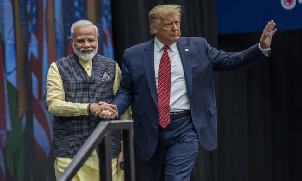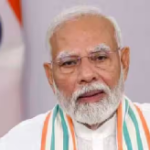Ashutosh
A political analyst in the US called Donald Trump’s victory ‘magic realism’. Intellectuals in America are in shock. They are aghast to see the margin of Trump’s victory and are trying to figure out the reason. They are struggling to understand if it is the defeat of elite politics or a rejection of democracy as was being played out in America. But what surprised me more was the reaction of certain sections in India. Instead of mourning the defeat of an Indian-origin candidate, they are celebrating the victory of an American Christian, supported by an evangelical church. These are the same people who were angry when Hindus were targeted in Bangladesh and in Canada by the ‘forces of evil’.
Kamala Harris is the daughter of a Hindu mother. She is proud of her Hindu origin. A Hindu woman who went on to become the Vice President of America and finally a candidate for the post of president, is a remarkable story. Unlike Hillary Clinton, she is not the product of entitlement or member of American establishment; she is an outlier who rose from humble background to become the Vice President of America by sheer grit, talent and hard work.
Why Are Indians Happy?
But why are these people happy in her defeat? Is it because she did not pay any lip service to Bangladeshi Hindus, like Trump did? Or is it because the politics of Kamla Harris—she is not divisive and she talks about democracy and constitutionalism—makes these people uncomfortable? Is it because she does not support the politics of majoritarianism? Or that she speaks for people of all faiths and does not discriminate between people on the basis of their race and gender? Or is it because she does not crack crass and sexist jokes like Trump does?
Those who are celebrating Trump assuming that he is a friend of India and that India will benefit from his presidency are living in a fool’s paradise. They are victims of false consciousness and prisoners of a fantasy. It is important to remember that Trump is an American and the President of the United States. His promise is to make America great again—not India. Any steps Trump takes to fulfil his promise of making America great again will likely come at India’s expense, as well as that of the rest of the world. If taking strong measures against India becomes necessary, he will not hesitate to do so.
Trump Politics Is Transactional
We must remember that his politics is not doctrinaire but purely transactional. India will soon face the impact of his cynicism. He will likely impose restrictions on the entry of Indians into the United States, with the H1B visa program being the first casualty. Trade with the US will become more challenging as he will pressure the Indian government to “cut tariffs” and may even “impose higher tariffs on Indian goods”. Even before his election, he had grouped India with Brazil and China on the issue of tariffs and called India a “very big abuser of tariffs”. If he follows through on his promise to expel immigrants—a major commitment to his American voters—Indians will not be exempt.
However, the situation would have been similar with Kamala Harris too. Had she been elected president, she would have also prioritised America’s interests, despite her Indian heritage. Therefore, regardless of who wins, India has no reason to celebrate. India must focus on protecting its national interests, and it is always preferable to deal with a leader who is predictable and stable. Trump, however, is an unpredictable figure with an unstable character and did not have a clean record during his first term as president.
Trump’s Biggest Supporters? Conservative Christians
I am sure those who are rejoicing Trump’s victory must be aware that Trump represents a revival of ‘Christian nationalism’, which many like Bishop Michael Curry called a ‘threat to America’s soul’. The New York Times reported, “He (Trump) says he will affirm that God made only two genders, male and female. He will create a task force to fight anti-Christian bias. And he will give enhanced access to conservative Christian leaders, if they elect him.” He says, “We have to save religion.” The New York Times writes, “And for nearly a decade, right-wing Christian power has intensified, largely under Mr Trump’s watch. He won the White House in 2016 promising that “Christianity will have power.”
Trump’s strongest support comes from Middle America, a bastion of conservative Christians. In this election, evangelical churches were especially active among Latin American Christians—who traditionally vote for the Democratic Party—convincing them to support Trump. And they succeeded. More than 40% of Latinos backed Trump, contributing significantly to his substantial victory margin.
Does this mean that those in India who champion Hindu nationalism are now endorsing the rise of Christian nationalism? If so, why do proponents of Hindutva decry Christianity, alongside Islam, as an inimical force threatening India’s unity and integrity, alleging that it channels millions of dollars to convert Hindus to Christianity?
What Golwalkar Said
It is worth remembering that long ago, Golwalkar, a father figure of Hindutva, named Christians as one of the three enemies of India and accused Christian missionaries of working under the guise of humanitarian aid to make India a Christian land. He wrote, “Such is the role of Christian gentlemen residing in our land today, out to demolish not only the religious and social fabric of our life but also to establish political domination in various pockets and, if possible, all over the land.” He further stated, “Wherever they have stepped, they have drenched those lands with the blood and tears of the natives and liquidated whole races. Do we not know the heart-rending stories of how they annihilated the natives in America, Australia, and Africa?”
I don’t know whether the RSS has changed its stance on Christian missionaries or their ideology. Nor do I know if the RSS has reached some form of truce with Christian nationalism. The undeniable fact is that Trump’s America subscribes to the notion of a clash of civilisations and champions Christian causes. Despite its best intentions, Hindu nationalism cannot align with Trump’s Christian nationalism without undermining the very ideology of Hindutva. This raises the question: why is there so much support for Trump?
Is it not ironic that, on one hand, followers of Hindutva issue a clarion call in India for Hindu unity, while on the other, they are unwilling to support a woman of Hindu origin who has achieved significant success abroad—something that should inspire pride among Hindus? Does this not point to a kind of ideological confusion and contradiction within the movement that claims to make India great and position it as a Vishwaguru? This deserves serious contemplation.



